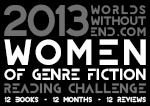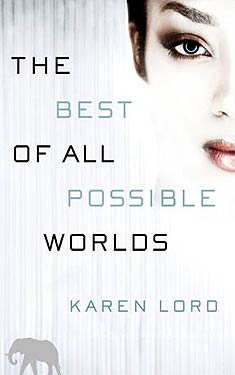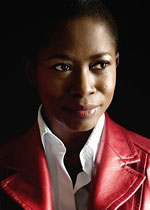WoGF Review: The Best of All Possible Worlds by Karen Lord
 Steven M. Long (Stevenmlong) is a writer and editor who blogs about the literary world of speculative fiction at stevenmlong.com and the rest of it (superheroes, aliens, online gaming and general silliness) at foesofreality.com. Blogging allows him to pretend that reading books and magazines and surfing speculative fiction sites constitutes “work.”
Steven M. Long (Stevenmlong) is a writer and editor who blogs about the literary world of speculative fiction at stevenmlong.com and the rest of it (superheroes, aliens, online gaming and general silliness) at foesofreality.com. Blogging allows him to pretend that reading books and magazines and surfing speculative fiction sites constitutes “work.”
 When I sat down to write this review I stumbled a little over how to categorize The Best of All Possible Worlds. Speculative fiction… yes… but it’s also a road novel, a sociological study, and (this came as something of a surprise) quite a good romance. The title of course made me think of Candide, and though I’d only go so far in drawing parallels it was hard not to see the novel in terms of the growth and choices of its lead character.
When I sat down to write this review I stumbled a little over how to categorize The Best of All Possible Worlds. Speculative fiction… yes… but it’s also a road novel, a sociological study, and (this came as something of a surprise) quite a good romance. The title of course made me think of Candide, and though I’d only go so far in drawing parallels it was hard not to see the novel in terms of the growth and choices of its lead character.
The primary narrative is that of Grace Delarua, a minor bureaucrat on the planet of Cygnus Beta, which serves as a gathering point for a myriad of cultures, a “galactic hinterland for pioneers and refugees.” To this world comes Dllenahkh, a Sadiri, whose planet has been destroyed and whose people are trying to find a new home and a way to preserve their culture. Together, along with a team sanctioned by both the government of Cygnus Beta and the Sadiri, they go on a year-long expedition to locate remnants of the Sadiri culture and people that have over time settled on Cygnus Beta, in hopes of finding enough cultural and genetic (there are more Sadiri men than women) elements to preserve the Sadiri race and and way of life.
Most of the novel is narrated by Delarua, and the mixture of humor, sarcasm, and self-deprecation she brings to the role is a real pleasure. I can’t remember the last time I was so engaged by a narrative voice (I laughed softly to myself several times and for me, that’s like a more effusive person falling to the ground, clutching their side). I think part of it is that The Best of All Possible Worlds manages to be both foreign – it is, after all, set on another world – and also familiar. At the beginning of the novel Delarua is presented as a simple functionary, “second assistant to the Chief Biotechnician of Tlaxce province” and though the novel moves beyond this, the fact that Delarua has a job to return to, a family (or lack thereof), and a life that isn’t too far away from someone you might know is something Lord never lets go of and uses to great effect.
In addition to Delarua’s narration, parts of the novel follows Dllenahkh – just enough to allow a window into where he’s coming from at different points, but not so much that the book strays from being Delarua’s story. The interplay and changing relationship between these two characters is at the emotional heart of the book, even as Delarua’s relationships with her coworkers, family and friends impact her as the novel’s central journey continues.
Lord does a fine job of drawing a space-faring future with enough details to create it, but not so many as to distract from the storylines that drive the novel thematically and emotionally. As Delarua, Dllenahkh and their companions explore the world of Cygnus Beta and interact with the different societies they encounter (some of which I found to be a little bit of a stretch, but I was having too good of a time by then to care), the novel becomes a study of the balances that are struck at the individual and cultural level between discipline and emotion, responsibility and individual choice.
 The Sadiri themselves are gifted psionics that bond with each other and their partners, and this ability is shared with the other human races to varying degrees. As a story device, this allows for an interesting exploration of personality, as ideas about the self, intuition, interpretation and the risks and benefits of being able to subtly influence those around you one way or the other are explored.
The Sadiri themselves are gifted psionics that bond with each other and their partners, and this ability is shared with the other human races to varying degrees. As a story device, this allows for an interesting exploration of personality, as ideas about the self, intuition, interpretation and the risks and benefits of being able to subtly influence those around you one way or the other are explored.
If anything, my primary complaint about The Best of All Possible Worlds would be that I wanted more: I wanted to go deeper into the cultures and societies, and explore Lord’s ideas about gender, matriarchy and patriarchy (which are touched on meaningfully, but… not… enough!). At the end of the novel I wasn’t really ready to let Delarua go, either – I wanted another few hundred pages of her to enjoy. The Best of All Possible Worlds is an example of how – with the proper level of complexity – a light, even funny narrator can still take the reader on a meaningful journey with an emotional payoff.
I’m going to have to step away from my normal process of focusing my reading and reviewing on new releases and search out Lord’s first novel. In the meantime, I highly recommend The Best of All Possible Worlds.



















 Full Details
Full Details


No comments yet.
Sorry, the comment form is closed at this time.